Charles E W Bean, Diaries, AWM38 3DRL 606/253/1 - 1918 - 1939 - Part 9
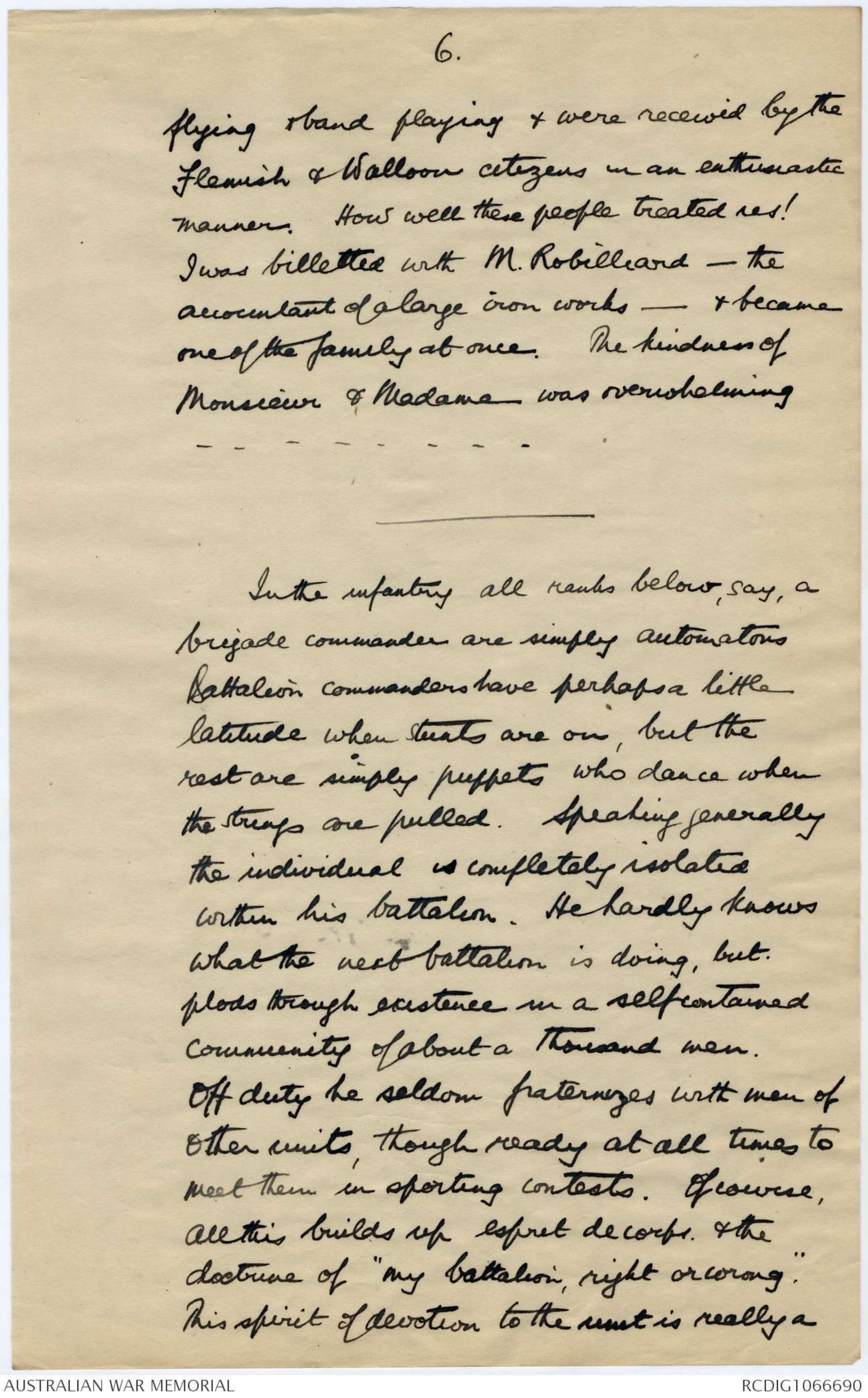
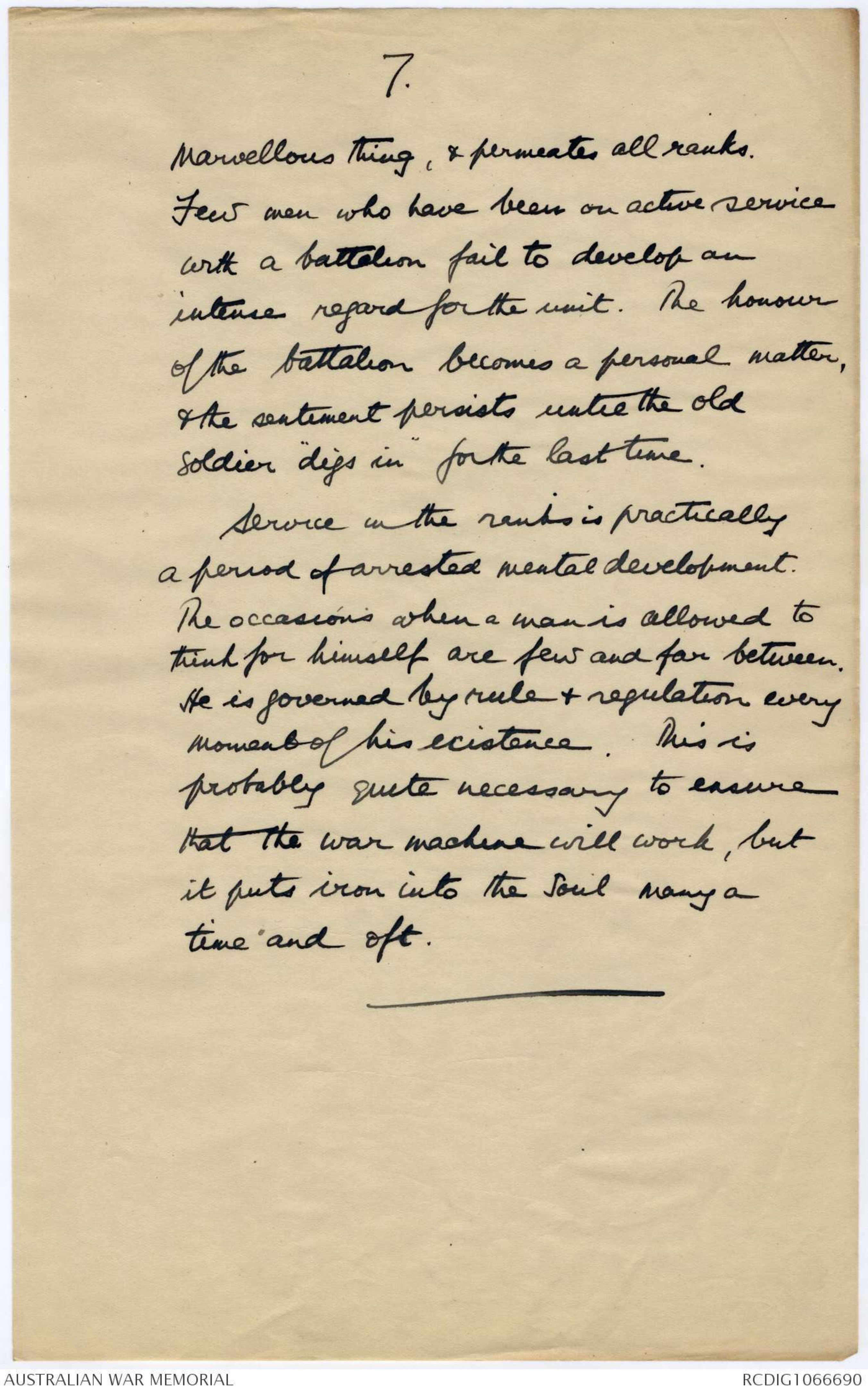
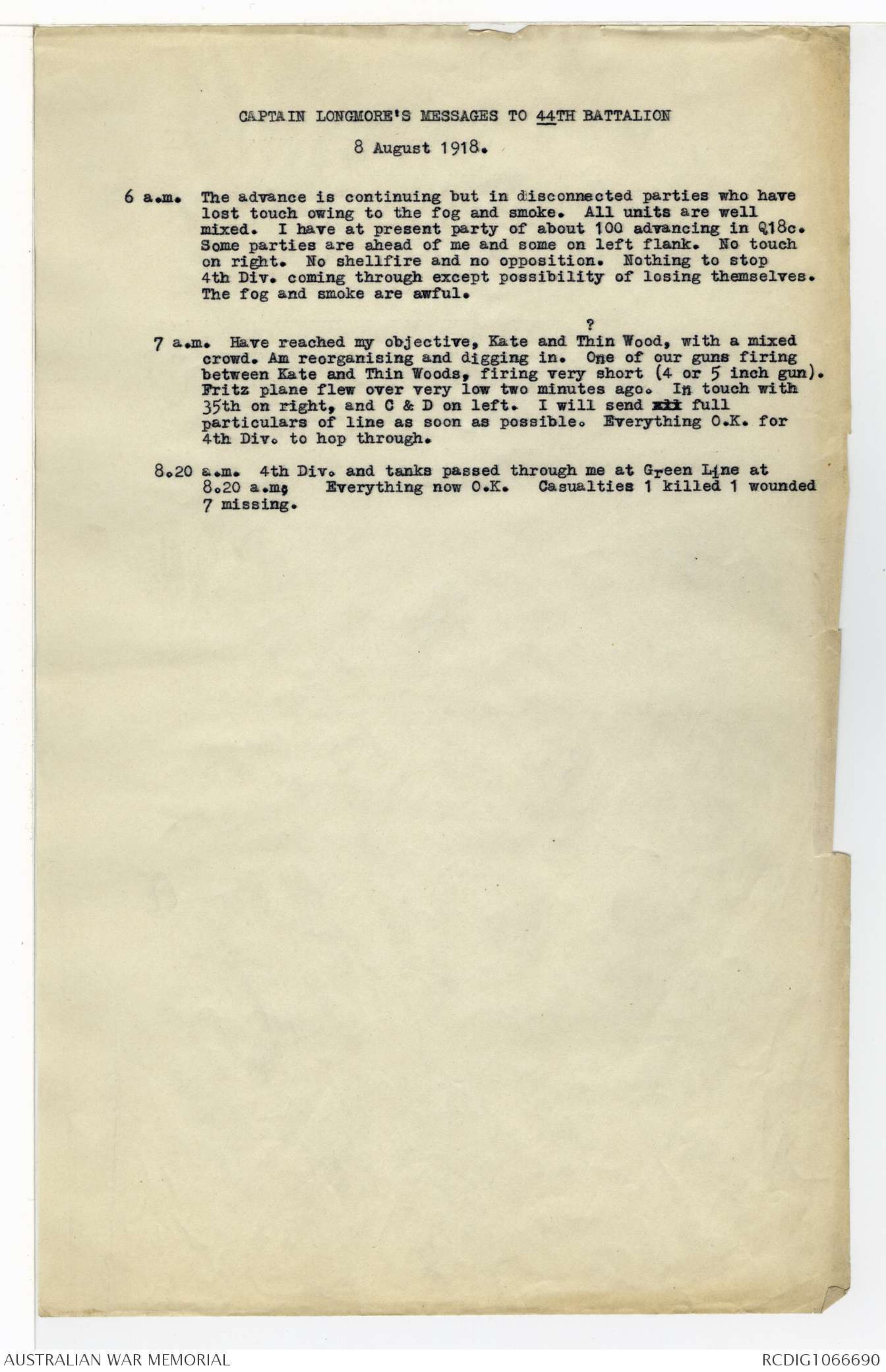
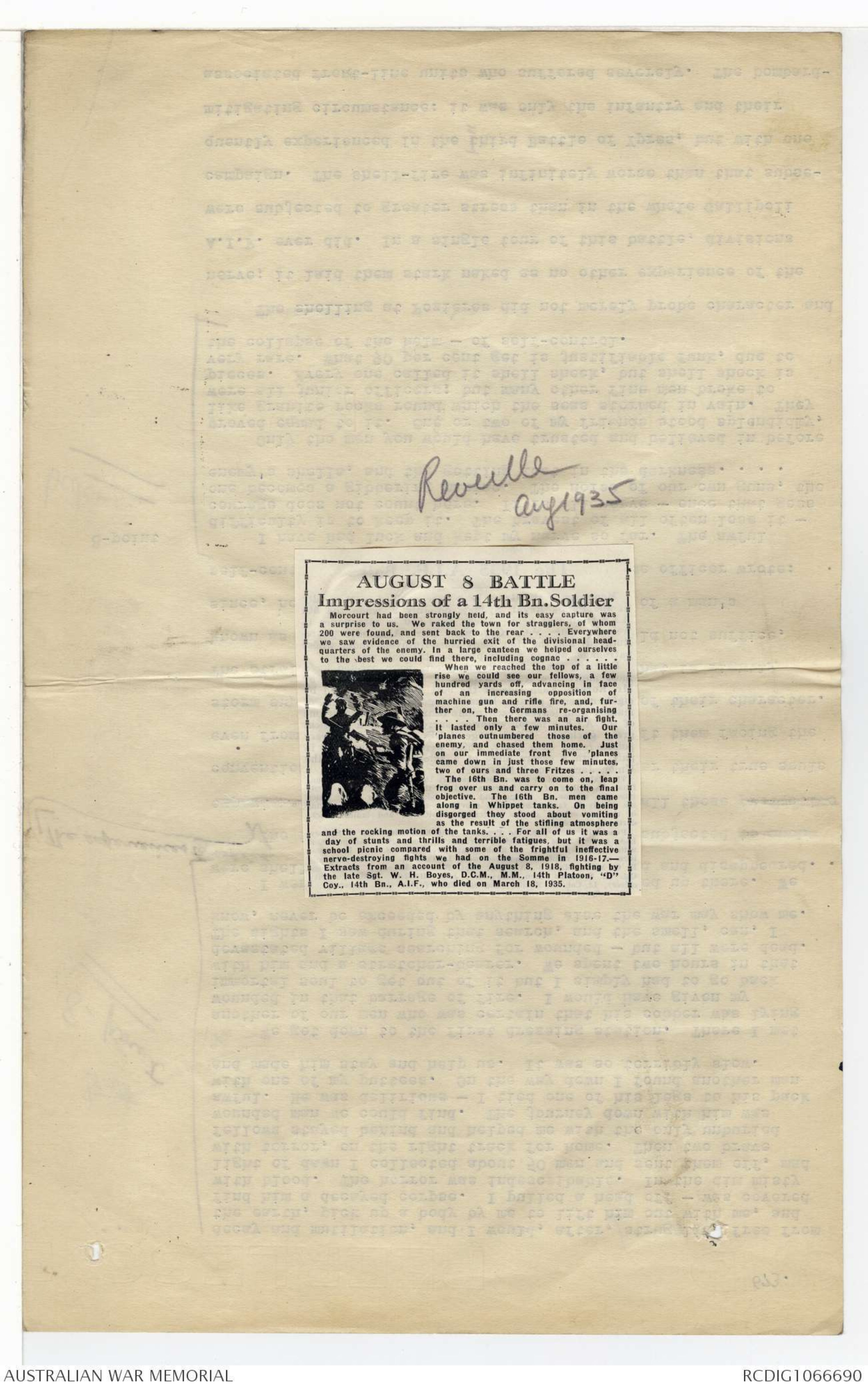
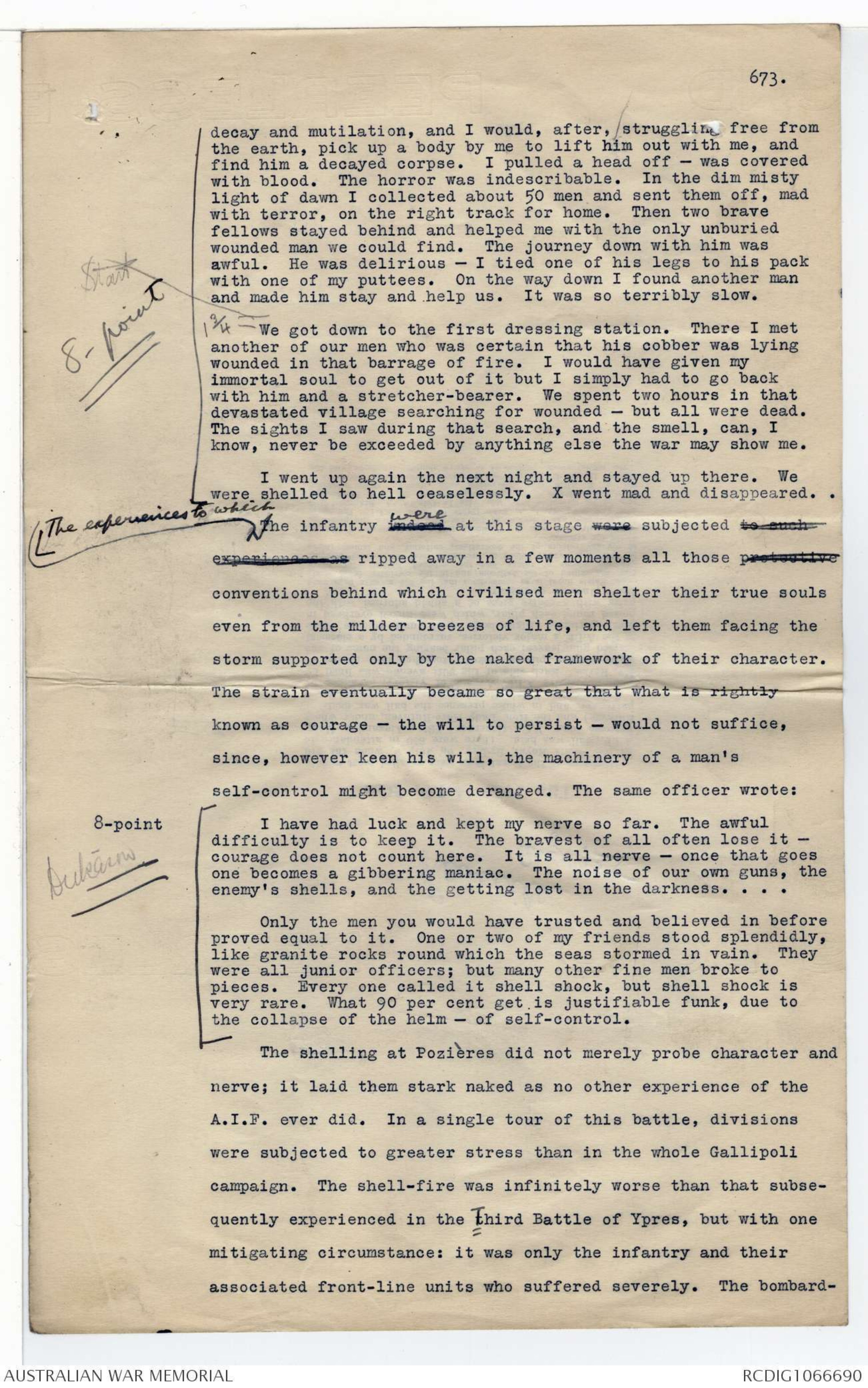
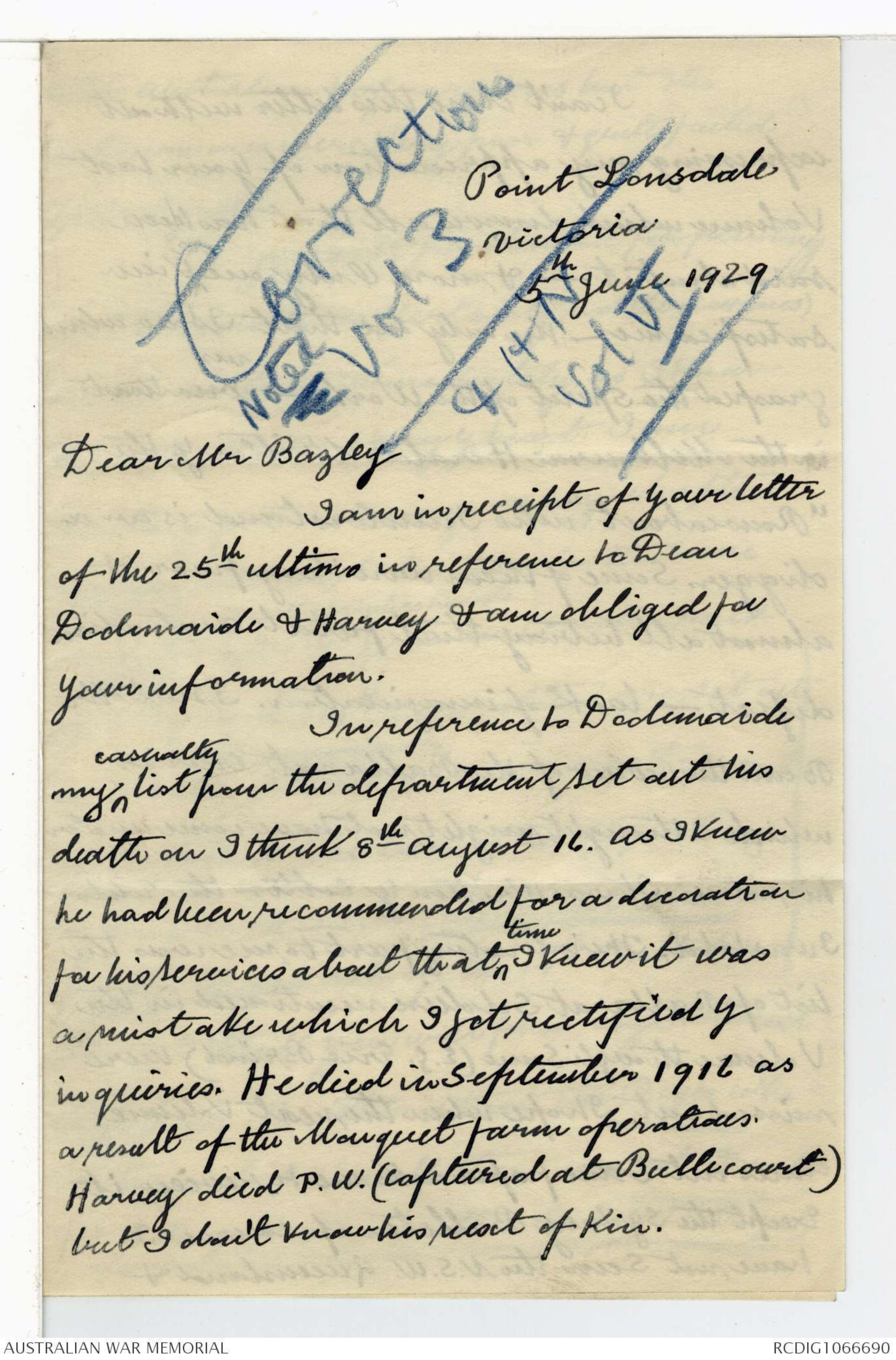
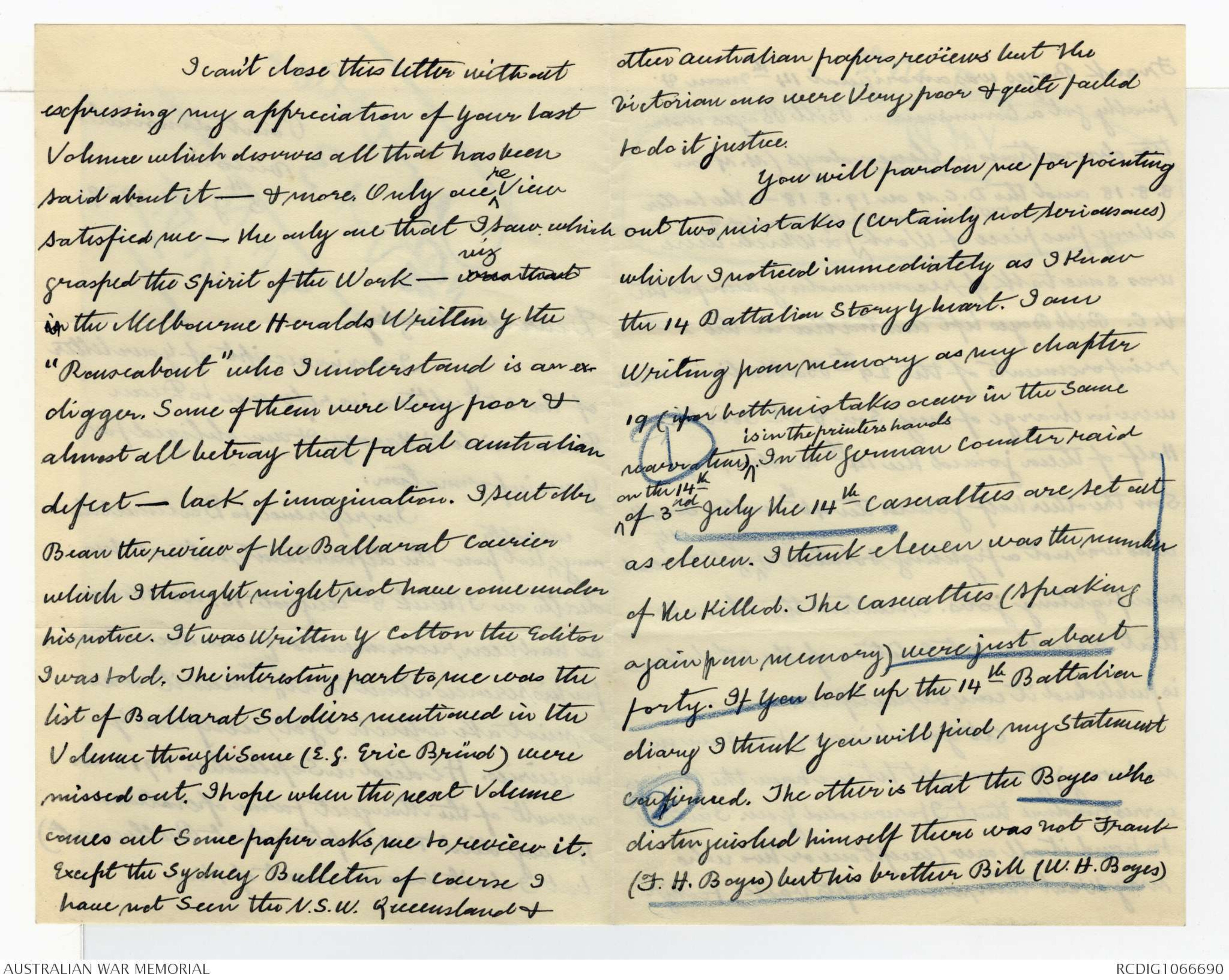
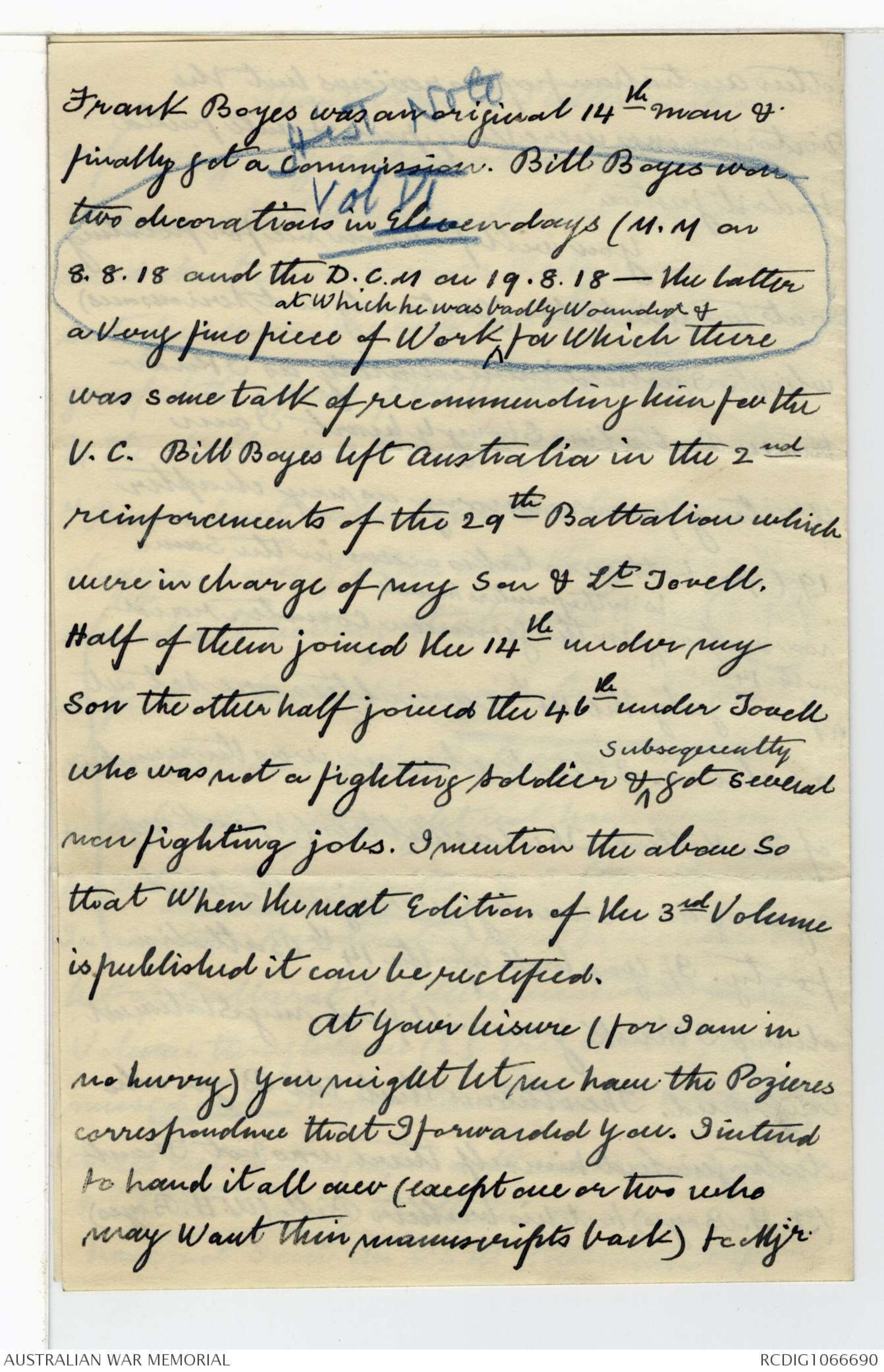
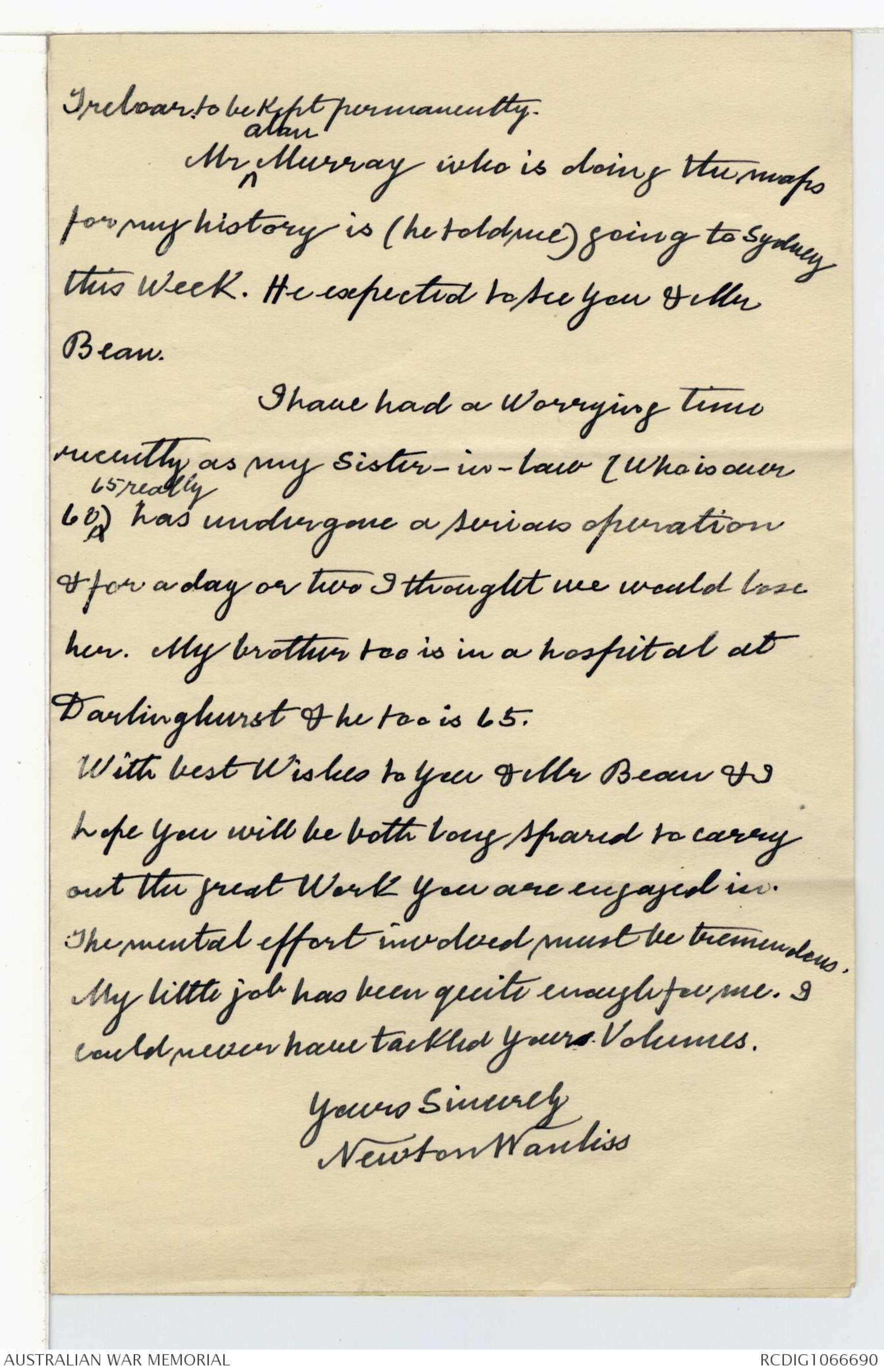
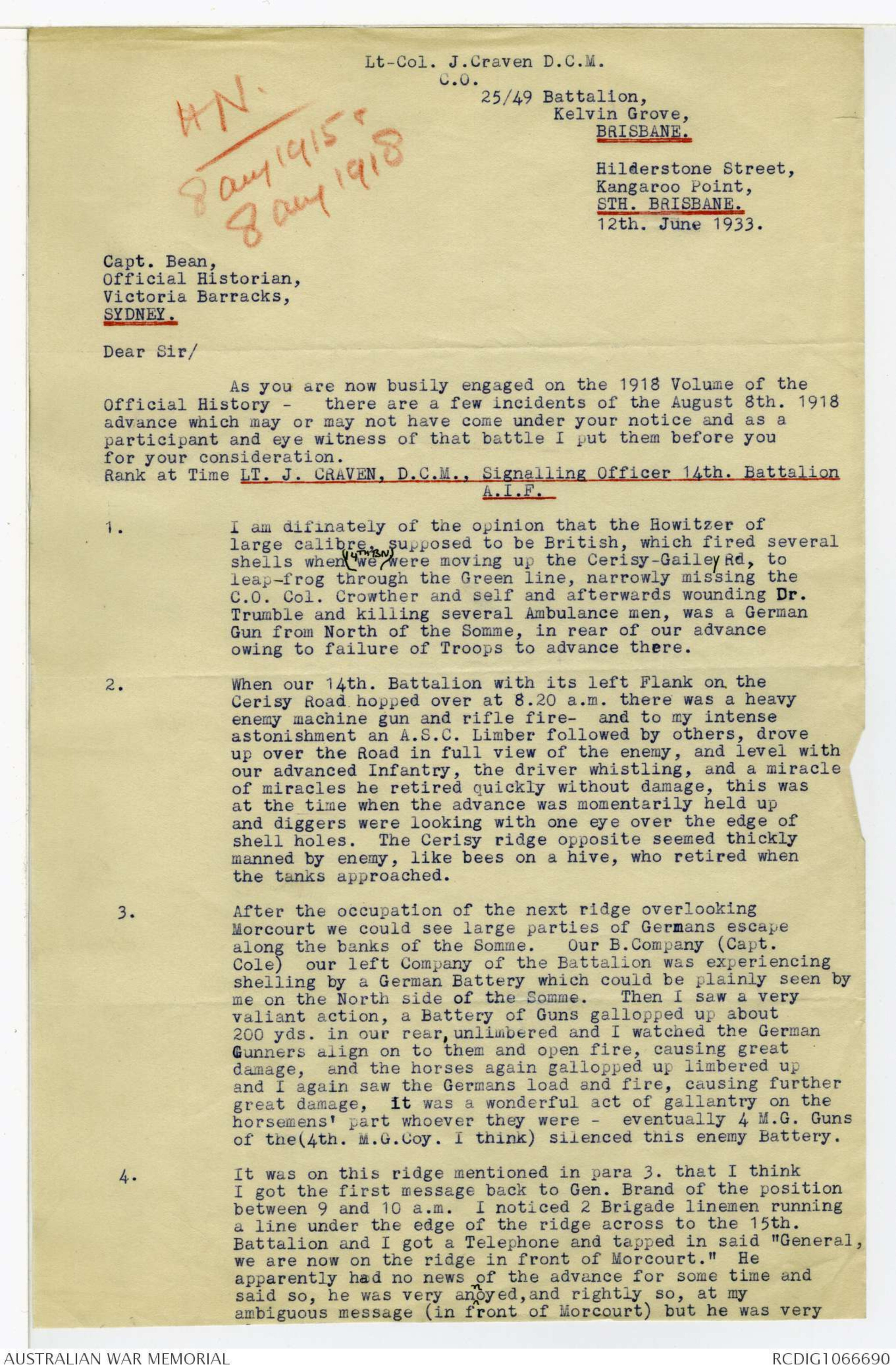
6.
flying & band playing & were received by the
Flemish and Walloon citizens in an enthusiastic
manner. How well these people treated us!
I was billetted with M. Robilliard - the
accountant of a large iron works - & became
one of the family at once. The kindness of
Monsieur & Madame was overwhelming
In the infantry all ranks below, say, a
brigade commander are simply automatons
Battalion commanders have perhaps a little
latitude when stunts are on, but the
rest are simply puppets who dance when
the strings are pulled. Speaking generally
the individual is completely isolated
within his battalion. He hardly knows
what the next battalion is doing, but
plods through existence in a self-contained
community of about a thousand men.
Off duty he seldom fraternizes with men of
other units, though ready at all times to
meet them in sporting contests. Of course,
all this builds up esprit de corps. & the
doctrine of "my battalion, right or wrong."
This spirit of devotion to the unit is really a
7.
marvellous thing, & permeates all ranks.
Few men who have been on active service
with a battalion fail to develop an
intense regard for the unit. The honour
of the battalion becomes a personal matter,
& the sentiment persists until the old
soldier "digs in" for the last time.
Service in the ranks is practically
a period of arrested mental development.
The occasions when a man is allowed to
think for himself are few and far between.
He is governed by rule & regulation every
moment of his existence. This is
probably quite necessary to ensure
that the war machine will work, but
it puts iron into the soul many a
time and oft.
CAPTAIN LONGMORE'S MESSAGES TO 44TH BATTALION
8 August 1918.
6 a.m. The advance is continuing but in disconnected parties who have
lost touch owing to the fog and smoke. All units are well
mixed. I have at present party of about 100 advancing in Q18c.
Some parties are ahead of me and some on left flank. No touch
on right. No shellfire and no opposition. Nothing to stop
4th Div. coming through except possibility of losing themselves.
The fog and smoke are awful.
7 a.m. Have reached my objective, Kate and Thin? Wood, with a mixed
crowd. Am reorganising and digging in. One of our guns firing
between Kate and Thin Woods, firing very short (4 or 5 inch gun).
Fritz plane flew over very low two minutes ago. In touch with
35th on right, and C & D on left. I will send xxx full
particulars of line as soon as possible. Everything O.K. for
4th Div. to hop through.
8.20 a.m. 4th Div. and tanks passed through me at Green Line at
8.20 a.m. Everything now O.K. Casualties 1 killed 1 wounded
7 missing.
Reveille
Aug 1935
AUGUST 8 BATTLE
Impressions of a 14th Bn. Soldier
Newspaper article. See original
673.
decay and mutilation, and I would, after, struggling free from
the earth, pick up a body by me to lift him out with me, and
find him a decayed corpse. I pulled a head off, was covered
with blood. The horror was indescribable. In the dim misty
light of dawn I collected about 50 men and sent them off, mad
with terror, on the right track for home. Then two brave
fellows stayed behind and helped me with the only unburied
wounded man we could find. The journey down with him was
awful. He was delirious - I tied one of his legs to his pack
with one of my puttees. On the way down I found another man
and made him stay and help us. It was so terribly slow.
[* Start -
8 - point
1¾ - *] We got down to the first dressing station. There I met
another of our men who was certain that his cobber was lying
wounded in that barrage of fire. I would have given my
immortal soul to get out of it but I simply had to go back
with him and a stretcher-bearer. We spent two hours in that
devastated village searching for wounded - but all were dead.
The sights I saw during that search, and the smell, can, I
know, never be exceeded by anything else the war may show me.
I went up again the next night and stayed up there. We
were shelled to hell ceaselessly. X went mad and disappeared..
The experiences to which the infantry indeed were at this stage were subjected to suchexperiences as ripped away in a few moments all those protective
conventions behind which civilised men shelter their true souls
even from the milder breezes of life, and left them facing the
storm supported only by the naked framework of their character.
The strain eventually became so great that what is rightly
known as courage - the will to persist - would not suffice,
since, however keen his will, the machinery of a man's
self-control might become deranged. The same officer wrote:
[*8 - point*] I have had luck and kept my nerve so far. The awful
difficulty is to keep it. The bravest of all often lose it -
[* [[?]] *] courage does not count here. It is all nerve - once that goes
one becomes a gibbering maniac. The noise of our own guns, the
enemy's shells, and the getting lost in the darkness . . . .
Only the men you would have trusted and believed in before
proved equal to it. One or two of my friends stood splendidly,
like granite rocks round which the seas stormed in vain. They
were all junior officers; but many other fine men broke to
pieces. Every one called it shell shock, but shell shock is
very rare. What 90 per cent get is justifiable funk, due to
the collapse of the helm - of self-control.
The shelling at Pozières did not merely probe character and
nerve; it laid them stark naked as no other experience of the
A.I.F. ever did. In a single tour of this battle, divisions
were subjected to greater stress than in the whole Gallipoli
campaign. The shell-fire was infinitely worse than that
subsequently experienced in the Third Battle of Ypres, but with one
mitigating circumstance: it was only the infantry and their
associated front-line units who suffered severely. The bombard-
[* Corrections
Noted Vol 3
& HN
Vol VI *]
Point Lonsdale
Victoria
5th June 1929
Dear Mr Bazley
I am in receipt of your letter
of the 25th ultimo in reference to Dean
Dodemaide & Harvey & I am obliged for
your information.
In reference to Dodemaide
my ^casualty list from the department set out his
death on I think 8th August 16. As I knew
he had been recommended for a decoration
for his services about that ∧time I knew it was
a mistake which I got rectified by
inquiries. He died in September 1916 as
a result of the Mouquet farm operations.
Harvey died P.W. (captured at Bullecourt)
but I don't know his next of Kin.
I can't close this letter without
expressing my appreciation of your last
Volume which deserves all that has been
said about it - & more. Only one ^re View
satisfied me - the only one that I saw which
grasped the spirit of the Work - xxx xxxx viz
in the Melbourne Heralds Written by the
"Rouseabout" who I understand is an
ex-digger. Some of them were Very poor &
almost all betray that fatal Australian
defect - lack of imagination. I sent Mr
Bean the review of the Ballarat Courier
which I thought might not have come under
his notice. It was Written by Cotton the Editor
I was told. The interesting part to me was the
list of Ballarat Soldiers mentioned in the
Volume though Some (e.g. Eric Brind) were
missed out. I hope when the next Volume
comes out some paper asks me to review it.
Except the Sydney Bulletin of course I
have not seen the N.S.W. Queensland &
other Australian papers reviews but the
Victorian ones were Very poor & quite failed
to do it justice.
You will pardon me for pointing
out two mistakes (certainly not serious ones)
which I noticed immediately as I know
the 14 Battalion Story by heart. I am
Writing from memory as my chapter
19 (if or both mistakes occur in the same
[*1*] narration) ^is in the printers hands. In the German counter raid
^on the 14th of 3rd July Vic 14th casualties are set out
as eleven. I think eleven was the number
of the Killed. The casualties (speaking
again from memory) were just about
forty. If you look up the 14th Battalion
diary I think you will find my Statement
[*2*] confirmed. The other is that the Boyes who
distinguished himself there was not Frank
(F.H. Boyes) but his brother Bill (W.H. Boyes)
[*Hist Note
Vol VI*]
Frank Boyes was an original 14th man &
finally got a commission. Bill Boyes won
two decorations in Eleven days (M.M on
8.8.18 and the D.C.M on 19.8.18 - the latter
a Very fine piece of Work ^at which he was badly Wounded & for which there
was some talk of recommending him for the
V.C. Bill Boyes left Australia in the 2nd
reinforcements of the 29th Battalion which
were in charge of my Son & Lt Tovell.
Half of them joined the 14th under my
Son the other half joined the 46th under Tovell
who was not a fighting soldier & ^subsequently got several
men fighting jobs. I mention the above so
that when the next Edition of the 3rd Volume
is published it can be rectified.
At your leisure (for I am in
no hurry) you might let me have the Pozieres
correspondence that I forwarded you. I intend
to hand it all over (except one or two who
may want their manuscripts back) to Mjr
Treloar to be kept permanently.
Mr ^Alan Murray who is doing the maps
for my history is (he told me) going to Sydney
this week. He expected to see you & Mr
Bean.
I have had a worrying time
recently as my Sister-in-law (who is over
60^65 really) has undergone a serious operation
& for a day or two I thought we would
lose her. My brother too is in a hospital at
Darlinghurst & he too is 65.
With best wishes to you & Mr Bean & I
hope you will be both long spared to carry
out the great Work you are engaged in.
The mental effort involved must be tremendous.
My little job has been quite enough for me. I
could never have tackled yourx. Volumes.
Yours Sincerely
Newton Wanliss
[* HN
8 Aug 1915 &
8 Aug 1918 *]
Lt-Col. J. Craven D.C.M.
C.O.
25/49 Battalion,
Kelvin Grove,
BRISBANE.
Hilderstone Street,
Kangaroo Point,
STH. BRISBANE.
12th. June 1933.
Capt. Bean,
Official Historian,
Victoria Barracks,
SYDNEY.
Dear Sir/
As you are now busily engaged on the 1918 Volume oof the
Official History - there are a few incidents of the August 8th. 1918
advance which may or may not have come under your notice and as a
participant and eye witness of that battle I put them before you
for your consideration.
Rank at Time LT. J. CRAVEN, D.C.M., Signalling Officer 14th. Battalion
A.I.F.
1. I am difinately of the opinion that the Howitzer of
large calibre, supposed to be British, which fired several
shells when we (14TH BN) were moving up the Cerisy-Gailey Rd, to
leap-frog through the Green line, narrowly missing the
C,O, Col. Crowther and self and afterwards wounding Dr.
Gun from North of the Somme, in rear of our advance
owing to failure of Troops to advance there.
2. When our 14th. Battalion with its left Flank on the
Cerisy road hopped over at 8.20 a.m. there was a heavy
enemy machine gun and rifle fire - and to my intense
astonishment an A.S.C. Limber followed by others, drove
up over the Road in full view of the enemy, and level with
our advanced Infantry, the driver whistling, and a miracle
of miracles he retired quickly without damage, this was
at the time when the advance was momentarily held up
and diggers were looking with one eye over the edge of
shell holes. The Cerisy ridge opposite seemed thickly
manned by enemy, like bees on a hive, who retired when
the tanks approached.
3. After the occupation of the next ridge overlooking
Morcourt we could see large parties of Germans escape
along the banks of the Somme. Our B. Company (Capt.
Cole) our left Company of the Battalion was experiencing
shelling by a German Battery which could be plainly seen by
me on the North side of the Somme. Then I saw a very
valiant action, a Battery of Guns gallopped up about
200 yds. in our rear, unlimbered and I watched the German
Gunners align on to them and open fire, causing great
damage, and the horses again gallopped up limbered up
and I again saw the Germans load and fire, causing further
great damage, it was a wonderful act of gallantry on the
horsemens' part whoever they were - eventually 4 M.G. Guns
of the (4th. M.G. Coy. I think) silenced this enemy Battery.
4. It was on this ridge mentioned in para 3. that I think
I got the first message back to Gen. Brand of the position
between 9 and 10 a.m. I noticed 2 Brigade linemen running
a line under the edge of the ridge across to the 15th.
Battalion and I got a Telephone and tapped in said "General,
we are now on the ridge in front of Morcourt." He
apparently had no news of the advance for some time and
said so, he was very an∧noyed, and rightly so, at my
ambiguous message (in front of Morcourt) but he was very
 Sam scott
Sam scottThis transcription item is now locked to you for editing. To release the lock either Save your changes or Cancel.
This lock will be automatically released after 60 minutes of inactivity.